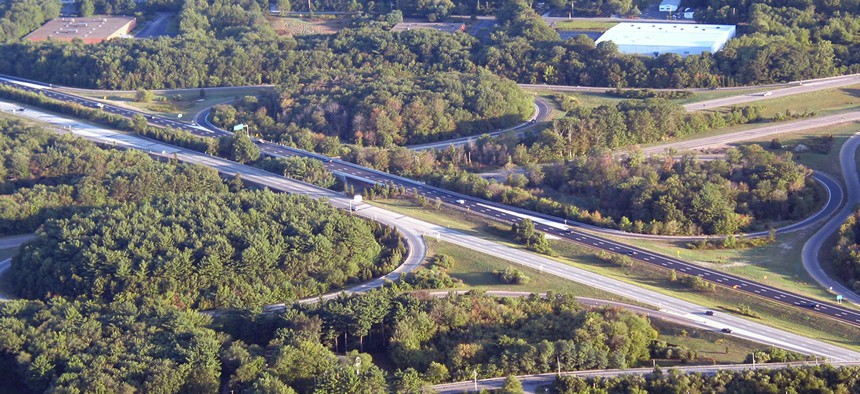
SmarterMedium/Shutterstock.com
Long-Term Highway Bill Approved by Senate, Setting Up Negotiations With House
The chambers will try to split their differences by October, when a three-month patch runs out.
The Senate passed a major highway bill Thursday in the hopes of providing certainty to states desperate to repair crumbling roads and bridges after years of lurching from one short-term agreement to the next.
The Senate's thousand-plus-page, $350 billion bill, which was approved on a 65-34 vote, was crafted by strange bedfellows—Republican Sen. James Inhofe of Oklahoma and Democratic Sen. Barbara Boxer of California. It would be the first long-term highway bill since 2005, while also setting new policy for freight, rail, and transit programs that sponsors say will make it easier for states and localities to invest in infrastructure.
"The best thing about it is it's a long-term bill. Our big problems can't be addressed unless you have a long-term bill," Inhofe said in an interview.
But with the two chambers divided on several key fronts, none of this long-term work is happening until fall at the earliest, if it happens at all.
First, Congress had to pass at least one more short-term bill; the House left for the August recess after passing a multibillion-dollar, three-month patch to beat Friday's deadline and inject needed cash to the Highway Trust Fund. The Senate approved that extension on Thursday afternoon, on a 91-4 vote, to give time to debate and pass a long-term bill.
The House doesn't yet have a similar long-term bill ready, but the Transportation and Infrastructure Committee will work on one after the August recess to have a basis for negotiations.
"We all want the House to have the space it needs to develop its own bill, because we all want to work out the best possible legislation for the American people in conference," said Senate Majority Leader Mitch McConnell.
The Senate bill would create a multibillion-dollar program to fund freight programs, while setting new policy to prioritize repair grants for high-risk projects. It would make efforts to shorten the timeline for some environmental reviews for major infrastructure projects, a major industry priority, and offers more money to transit and rail projects.
But it also contains a number of trouble spots to navigate. The Senate bill includes language to reauthorize the currently expired Export-Import Bank, a provision that is supported by majorities in both chambers but strongly opposed by conservatives—including House GOP leaders.
And Democrats have concerns that more needs to be done to improve rail safety, including removing language that extends a deadline for installing a system known as Positive Train Control, which experts say would have averted the recent Amtrak crash in Philadelphia. Some Democrats are pressing for stronger auto-safety language and higher fines for auto recalls, although Senate Commerce Committee Chairman John Thune made changes to that language in a bid to win more support, including tripling fines for delayed auto recalls to $105 million.
Another major problem is how to pay for the bill. The Senate's bill has provided only about three years of funding, adding to its primary source, the 18.4-cent federal gas tax, in part by reducing the dividend rate the Federal Reserve pays to big banks and selling off the government's crude-oil reserves. Some senators agree with their skeptical House colleagues that the pay-fors, some of which raise revenue over 10 years for a three-year fix, are inadequate. This week, GOP Sen. Bob Corker of Tennessee called the bill "generational theft," while Democratic Sen. Sherrod Brown of Ohio asked, "What kind of game is this?"
The first task for the highway bill's future negotiations will be to smooth out inter-chamber tensions. After House Speaker John Boehner reportedly called the bill a "piece of shit" in a closed-door meeting this week with colleagues, Boxer responded with a speech on the Senate floor directed squarely at the House. In front of a poster board charging, "Where is the House bill?" she asked, "What have you done?"
But this particular highway bill will probably be better known as the setting for a rare intraparty insult. After Senate Majority Leader McConnell allowed a vote on an amendment to reauthorize the Export-Import Bank, Sen. Ted Cruz of Texas, a GOP presidential candidate, took to the floor and accused McConnell of lying. Cruz later said McConnell worked in cahoots with Democratic Leader Harry Reid as part of a "Washington cartel."
Cruz's charges were roundly condemned by McConnell and his allies, but the Ex-Im Bank still faces an uncertain future after losing its charter to make and back new loans last month amid a wave of conservative opposition.
(Image via SmarterMedium/Shutterstock.com)






